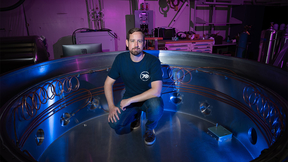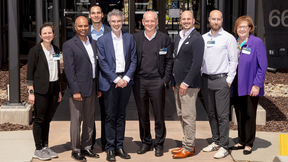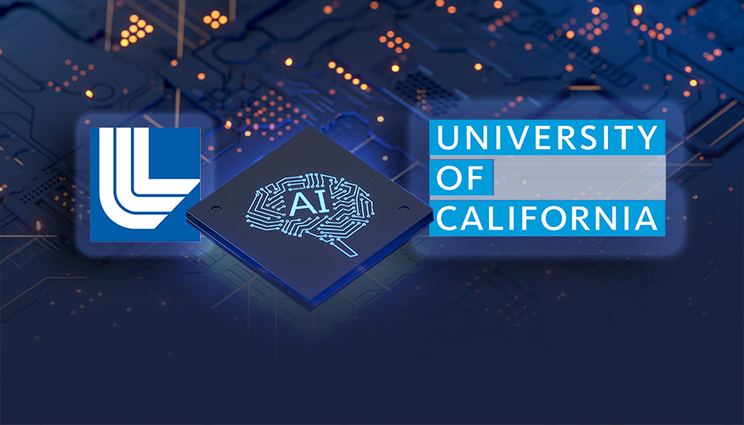LLNL, University of California initiative fosters academic partnership
A new joint initiative between the Lawrence Livermore National Laboratory (LLNL) Weapons and Complex Integration (WCI) Directorate and the University of California (UC) is aimed at developing next generation academic leadership with strong and enduring national laboratory connections.
The LLNL Early Career UC Faculty Initiative is accepting proposals from untenured, tenure-track faculty at one of 10 UC campuses, soliciting innovative ideas in artificial intelligence and machine learning. The winning proposal is anticipated to receive funding for up to $1 million over a five-year period, beginning in summer 2023. The fund will allow faculty to build a research group, including undergraduates, graduate students and post-doctoral fellows.
“We’re really pleased to be launching this initiative as it will foster further collaboration and sustain long-term academic partnerships between LLNL researchers and the University of California academic community,” said Kelli Humbird, LLNL lead for the initiative. “Not only is this a great opportunity for UC faculty to receive funding and Lab support for their research, but LLNL technical researchers are also able to get involved in the research for the winning project. This initiative is another win-win for our long-standing partnership with UC.”
Expression of interest applications are due by Feb. 10. Applications should focus on overlapping research interests between the UC faculty and WCI programs and mission technical focus areas. The early deadline will help LLNL technical principal investigators engage with faculty to support them in preparing their full proposals.
The initiative is designed to provide Lab researchers with opportunities to be more connected to the UC community to enhance workforce and research objectives. The recipient will be able to develop their innovative ideas and advance their research, with the goal leading to gaining tenure and internally and externally recognized professional leadership.
For additional information about the initiative, including eligibility requirements, submission templates, proposal review criteria, timeline and more, visit the LLNL Early Career UC Faculty Initiative website.
Technical focus areas – Artificial intelligence and machine learning
Proposed research for the LLNL Early Career UC Faculty Initiative should focus on topics in the field of scientific artificial intelligence and machine learning. Specifically, proposals should align with one or more of the following topic areas supported by this year’s initiative:
- AI for advanced manufacturing. Digital twin development, AI process monitoring, control and optimization and additive manufacturing.
- AI-driven experiments. Development of methods for intelligent drivers and AI-driven facility operations, with particular focus on precise control, high-volume data and high-repetition rate experiments.
- Concept extraction from unstructured data. Autoclassification of historical and recent documents; natural language processing models to identify new findings from records.
- Interpretable Bayesian analysis of high-dimensional data. Development of methods for combining simulations and measured spectral data to infer plasma conditions for complex high-energy-density science experiments.
- Interpretable ML surrogates for time-dependent systems. Development of surrogate models to accelerate computationally demanding simulations for rapid decision making (e.g., optimization, inverse problems).
- ML for linear induction accelerators. Detecting causes of instabilities, guide beam transport, automated analysis of system diagnostics.
- ML-based radiographic analysis. Unsupervised ML for interpretable feature detection; similarity metrics for images, denoising of experimental data.
- Object detection for autonomous drones. ML data fusion from multiple sensor modalities (e.g., chemical, optical, radio) for object detection; optimization of navigation during object search; one shot learning for autonomous drones.
- Physics-aware ML for nuclear data. Leverage deep learning techniques to model reaction rates and decay properties of nuclides; propagate nuclear data uncertainties for applied science applications; identify highest priority experiments to reduce uncertainties.
- Simulation-trained, observation-evaluated ML models. Detection of anomalous features between simulated and experimental images; developing statistical distances of experimental data from simulated distributions; projection of experimental data onto reduced order simulated data manifolds.
- Strategies for sampling. Use AI/ML to guide the design of experiments in mid-high dimensional spaces. Develop provable measures of robustness, uncertainty and convergence.
Contact
 Paul Rhien
Paul Rhien
[email protected]
(925) 422-4206
Related Links
LLNL Early Career UC Faculty InitiativeTags
ASCHPC, Simulation, and Data Science
Computing
Engineering
Physical and Life Sciences
Featured Articles








